Job Satisfaction: Importance, Factors, and Causes Analysis
VerifiedAdded on 2021/02/20
|8
|2356
|489
Essay
AI Summary
This essay provides a comprehensive overview of job satisfaction, beginning with its definition as the level of contentment workers experience with their jobs. It highlights the importance of job satisfaction from both employee and employer perspectives, emphasizing its role in career growth, work-life balance, productivity, and customer satisfaction. The essay then delves into various factors influencing job satisfaction, including compensation, working conditions, recognition, job security, challenges, and career growth. It also discusses the facets of job satisfaction, such as job content, work environment, and compensation. Finally, it explores the causes of job satisfaction, including experience, association, social learning, and heredity. The essay concludes by referencing relevant literature to support its arguments, providing a thorough analysis of the multifaceted concept of job satisfaction.

Individual literature
review
review
Paraphrase This Document
Need a fresh take? Get an instant paraphrase of this document with our AI Paraphraser
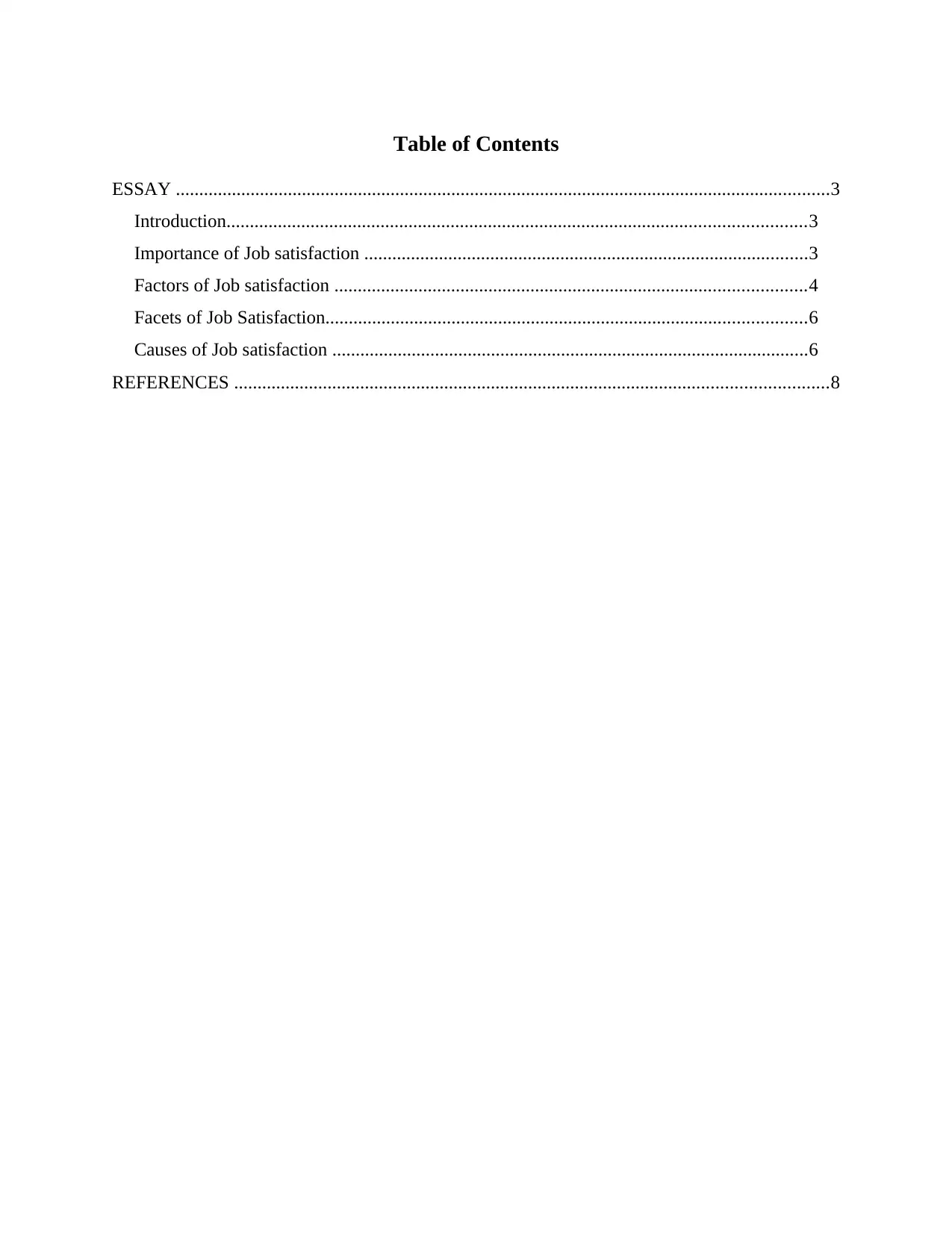
Table of Contents
ESSAY ............................................................................................................................................3
Introduction............................................................................................................................3
Importance of Job satisfaction ...............................................................................................3
Factors of Job satisfaction .....................................................................................................4
Facets of Job Satisfaction.......................................................................................................6
Causes of Job satisfaction ......................................................................................................6
REFERENCES ...............................................................................................................................8
ESSAY ............................................................................................................................................3
Introduction............................................................................................................................3
Importance of Job satisfaction ...............................................................................................3
Factors of Job satisfaction .....................................................................................................4
Facets of Job Satisfaction.......................................................................................................6
Causes of Job satisfaction ......................................................................................................6
REFERENCES ...............................................................................................................................8
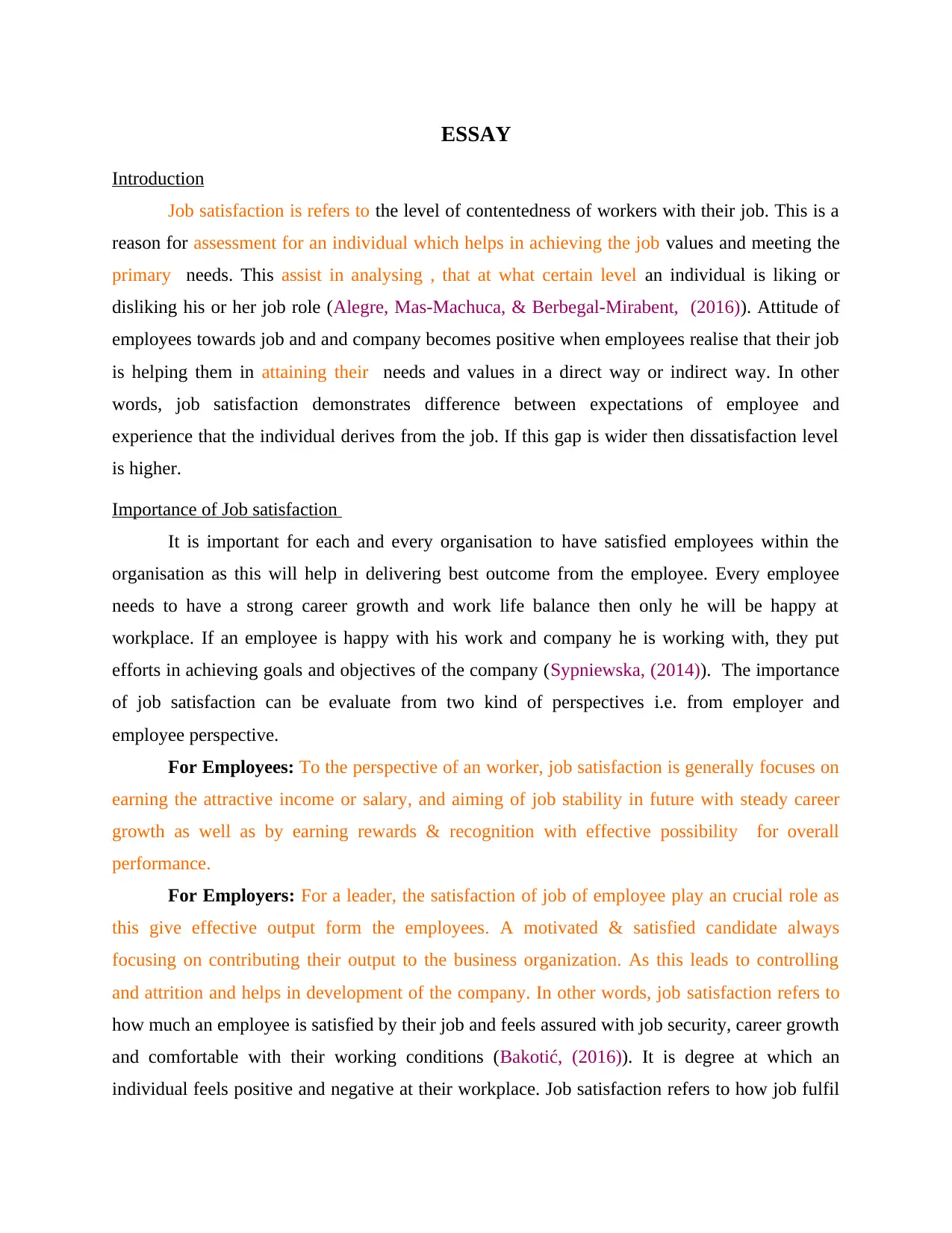
ESSAY
Introduction
Job satisfaction is refers to the level of contentedness of workers with their job. This is a
reason for assessment for an individual which helps in achieving the job values and meeting the
primary needs. This assist in analysing , that at what certain level an individual is liking or
disliking his or her job role (Alegre, Mas-Machuca, & Berbegal-Mirabent, (2016)). Attitude of
employees towards job and and company becomes positive when employees realise that their job
is helping them in attaining their needs and values in a direct way or indirect way. In other
words, job satisfaction demonstrates difference between expectations of employee and
experience that the individual derives from the job. If this gap is wider then dissatisfaction level
is higher.
Importance of Job satisfaction
It is important for each and every organisation to have satisfied employees within the
organisation as this will help in delivering best outcome from the employee. Every employee
needs to have a strong career growth and work life balance then only he will be happy at
workplace. If an employee is happy with his work and company he is working with, they put
efforts in achieving goals and objectives of the company (Sypniewska, (2014)). The importance
of job satisfaction can be evaluate from two kind of perspectives i.e. from employer and
employee perspective.
For Employees: To the perspective of an worker, job satisfaction is generally focuses on
earning the attractive income or salary, and aiming of job stability in future with steady career
growth as well as by earning rewards & recognition with effective possibility for overall
performance.
For Employers: For a leader, the satisfaction of job of employee play an crucial role as
this give effective output form the employees. A motivated & satisfied candidate always
focusing on contributing their output to the business organization. As this leads to controlling
and attrition and helps in development of the company. In other words, job satisfaction refers to
how much an employee is satisfied by their job and feels assured with job security, career growth
and comfortable with their working conditions (Bakotić, (2016)). It is degree at which an
individual feels positive and negative at their workplace. Job satisfaction refers to how job fulfil
Introduction
Job satisfaction is refers to the level of contentedness of workers with their job. This is a
reason for assessment for an individual which helps in achieving the job values and meeting the
primary needs. This assist in analysing , that at what certain level an individual is liking or
disliking his or her job role (Alegre, Mas-Machuca, & Berbegal-Mirabent, (2016)). Attitude of
employees towards job and and company becomes positive when employees realise that their job
is helping them in attaining their needs and values in a direct way or indirect way. In other
words, job satisfaction demonstrates difference between expectations of employee and
experience that the individual derives from the job. If this gap is wider then dissatisfaction level
is higher.
Importance of Job satisfaction
It is important for each and every organisation to have satisfied employees within the
organisation as this will help in delivering best outcome from the employee. Every employee
needs to have a strong career growth and work life balance then only he will be happy at
workplace. If an employee is happy with his work and company he is working with, they put
efforts in achieving goals and objectives of the company (Sypniewska, (2014)). The importance
of job satisfaction can be evaluate from two kind of perspectives i.e. from employer and
employee perspective.
For Employees: To the perspective of an worker, job satisfaction is generally focuses on
earning the attractive income or salary, and aiming of job stability in future with steady career
growth as well as by earning rewards & recognition with effective possibility for overall
performance.
For Employers: For a leader, the satisfaction of job of employee play an crucial role as
this give effective output form the employees. A motivated & satisfied candidate always
focusing on contributing their output to the business organization. As this leads to controlling
and attrition and helps in development of the company. In other words, job satisfaction refers to
how much an employee is satisfied by their job and feels assured with job security, career growth
and comfortable with their working conditions (Bakotić, (2016)). It is degree at which an
individual feels positive and negative at their workplace. Job satisfaction refers to how job fulfil
⊘ This is a preview!⊘
Do you want full access?
Subscribe today to unlock all pages.

Trusted by 1+ million students worldwide
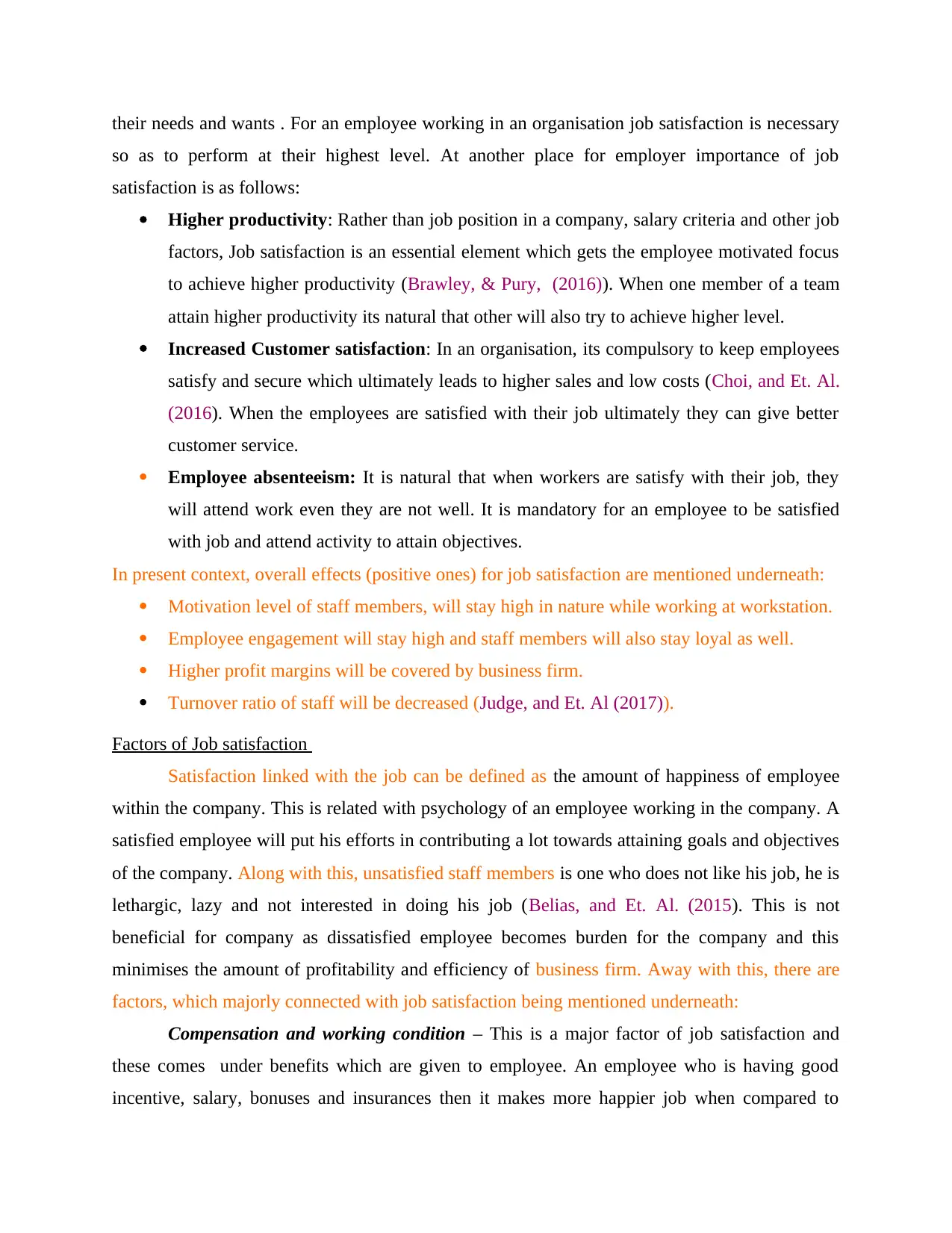
their needs and wants . For an employee working in an organisation job satisfaction is necessary
so as to perform at their highest level. At another place for employer importance of job
satisfaction is as follows:
Higher productivity: Rather than job position in a company, salary criteria and other job
factors, Job satisfaction is an essential element which gets the employee motivated focus
to achieve higher productivity (Brawley, & Pury, (2016)). When one member of a team
attain higher productivity its natural that other will also try to achieve higher level.
Increased Customer satisfaction: In an organisation, its compulsory to keep employees
satisfy and secure which ultimately leads to higher sales and low costs (Choi, and Et. Al.
(2016). When the employees are satisfied with their job ultimately they can give better
customer service.
Employee absenteeism: It is natural that when workers are satisfy with their job, they
will attend work even they are not well. It is mandatory for an employee to be satisfied
with job and attend activity to attain objectives.
In present context, overall effects (positive ones) for job satisfaction are mentioned underneath:
Motivation level of staff members, will stay high in nature while working at workstation.
Employee engagement will stay high and staff members will also stay loyal as well.
Higher profit margins will be covered by business firm.
Turnover ratio of staff will be decreased (Judge, and Et. Al (2017)).
Factors of Job satisfaction
Satisfaction linked with the job can be defined as the amount of happiness of employee
within the company. This is related with psychology of an employee working in the company. A
satisfied employee will put his efforts in contributing a lot towards attaining goals and objectives
of the company. Along with this, unsatisfied staff members is one who does not like his job, he is
lethargic, lazy and not interested in doing his job (Belias, and Et. Al. (2015). This is not
beneficial for company as dissatisfied employee becomes burden for the company and this
minimises the amount of profitability and efficiency of business firm. Away with this, there are
factors, which majorly connected with job satisfaction being mentioned underneath:
Compensation and working condition – This is a major factor of job satisfaction and
these comes under benefits which are given to employee. An employee who is having good
incentive, salary, bonuses and insurances then it makes more happier job when compared to
so as to perform at their highest level. At another place for employer importance of job
satisfaction is as follows:
Higher productivity: Rather than job position in a company, salary criteria and other job
factors, Job satisfaction is an essential element which gets the employee motivated focus
to achieve higher productivity (Brawley, & Pury, (2016)). When one member of a team
attain higher productivity its natural that other will also try to achieve higher level.
Increased Customer satisfaction: In an organisation, its compulsory to keep employees
satisfy and secure which ultimately leads to higher sales and low costs (Choi, and Et. Al.
(2016). When the employees are satisfied with their job ultimately they can give better
customer service.
Employee absenteeism: It is natural that when workers are satisfy with their job, they
will attend work even they are not well. It is mandatory for an employee to be satisfied
with job and attend activity to attain objectives.
In present context, overall effects (positive ones) for job satisfaction are mentioned underneath:
Motivation level of staff members, will stay high in nature while working at workstation.
Employee engagement will stay high and staff members will also stay loyal as well.
Higher profit margins will be covered by business firm.
Turnover ratio of staff will be decreased (Judge, and Et. Al (2017)).
Factors of Job satisfaction
Satisfaction linked with the job can be defined as the amount of happiness of employee
within the company. This is related with psychology of an employee working in the company. A
satisfied employee will put his efforts in contributing a lot towards attaining goals and objectives
of the company. Along with this, unsatisfied staff members is one who does not like his job, he is
lethargic, lazy and not interested in doing his job (Belias, and Et. Al. (2015). This is not
beneficial for company as dissatisfied employee becomes burden for the company and this
minimises the amount of profitability and efficiency of business firm. Away with this, there are
factors, which majorly connected with job satisfaction being mentioned underneath:
Compensation and working condition – This is a major factor of job satisfaction and
these comes under benefits which are given to employee. An employee who is having good
incentive, salary, bonuses and insurances then it makes more happier job when compared to
Paraphrase This Document
Need a fresh take? Get an instant paraphrase of this document with our AI Paraphraser
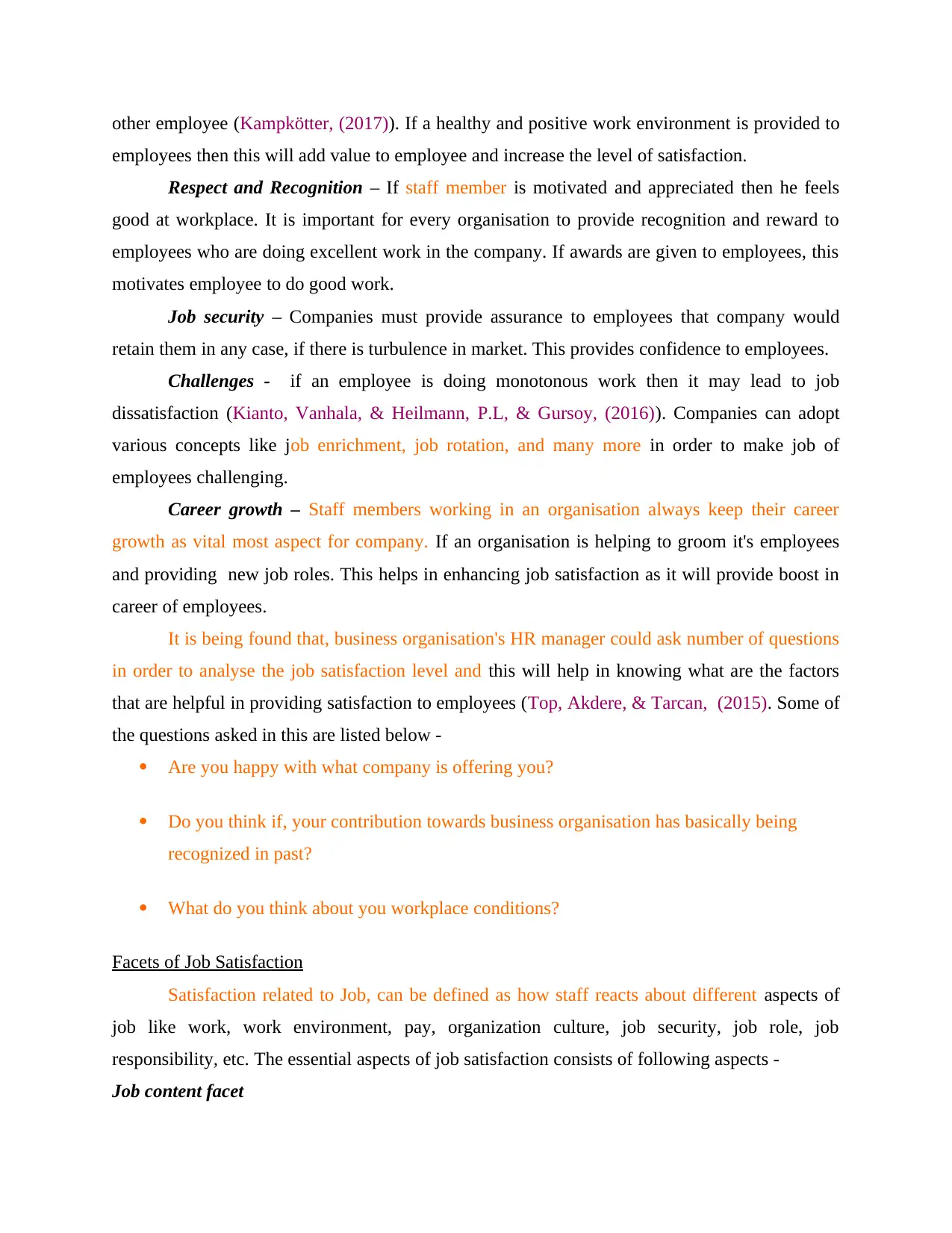
other employee (Kampkötter, (2017)). If a healthy and positive work environment is provided to
employees then this will add value to employee and increase the level of satisfaction.
Respect and Recognition – If staff member is motivated and appreciated then he feels
good at workplace. It is important for every organisation to provide recognition and reward to
employees who are doing excellent work in the company. If awards are given to employees, this
motivates employee to do good work.
Job security – Companies must provide assurance to employees that company would
retain them in any case, if there is turbulence in market. This provides confidence to employees.
Challenges - if an employee is doing monotonous work then it may lead to job
dissatisfaction (Kianto, Vanhala, & Heilmann, P.L, & Gursoy, (2016)). Companies can adopt
various concepts like job enrichment, job rotation, and many more in order to make job of
employees challenging.
Career growth – Staff members working in an organisation always keep their career
growth as vital most aspect for company. If an organisation is helping to groom it's employees
and providing new job roles. This helps in enhancing job satisfaction as it will provide boost in
career of employees.
It is being found that, business organisation's HR manager could ask number of questions
in order to analyse the job satisfaction level and this will help in knowing what are the factors
that are helpful in providing satisfaction to employees (Top, Akdere, & Tarcan, (2015). Some of
the questions asked in this are listed below -
Are you happy with what company is offering you?
Do you think if, your contribution towards business organisation has basically being
recognized in past?
What do you think about you workplace conditions?
Facets of Job Satisfaction
Satisfaction related to Job, can be defined as how staff reacts about different aspects of
job like work, work environment, pay, organization culture, job security, job role, job
responsibility, etc. The essential aspects of job satisfaction consists of following aspects -
Job content facet
employees then this will add value to employee and increase the level of satisfaction.
Respect and Recognition – If staff member is motivated and appreciated then he feels
good at workplace. It is important for every organisation to provide recognition and reward to
employees who are doing excellent work in the company. If awards are given to employees, this
motivates employee to do good work.
Job security – Companies must provide assurance to employees that company would
retain them in any case, if there is turbulence in market. This provides confidence to employees.
Challenges - if an employee is doing monotonous work then it may lead to job
dissatisfaction (Kianto, Vanhala, & Heilmann, P.L, & Gursoy, (2016)). Companies can adopt
various concepts like job enrichment, job rotation, and many more in order to make job of
employees challenging.
Career growth – Staff members working in an organisation always keep their career
growth as vital most aspect for company. If an organisation is helping to groom it's employees
and providing new job roles. This helps in enhancing job satisfaction as it will provide boost in
career of employees.
It is being found that, business organisation's HR manager could ask number of questions
in order to analyse the job satisfaction level and this will help in knowing what are the factors
that are helpful in providing satisfaction to employees (Top, Akdere, & Tarcan, (2015). Some of
the questions asked in this are listed below -
Are you happy with what company is offering you?
Do you think if, your contribution towards business organisation has basically being
recognized in past?
What do you think about you workplace conditions?
Facets of Job Satisfaction
Satisfaction related to Job, can be defined as how staff reacts about different aspects of
job like work, work environment, pay, organization culture, job security, job role, job
responsibility, etc. The essential aspects of job satisfaction consists of following aspects -
Job content facet
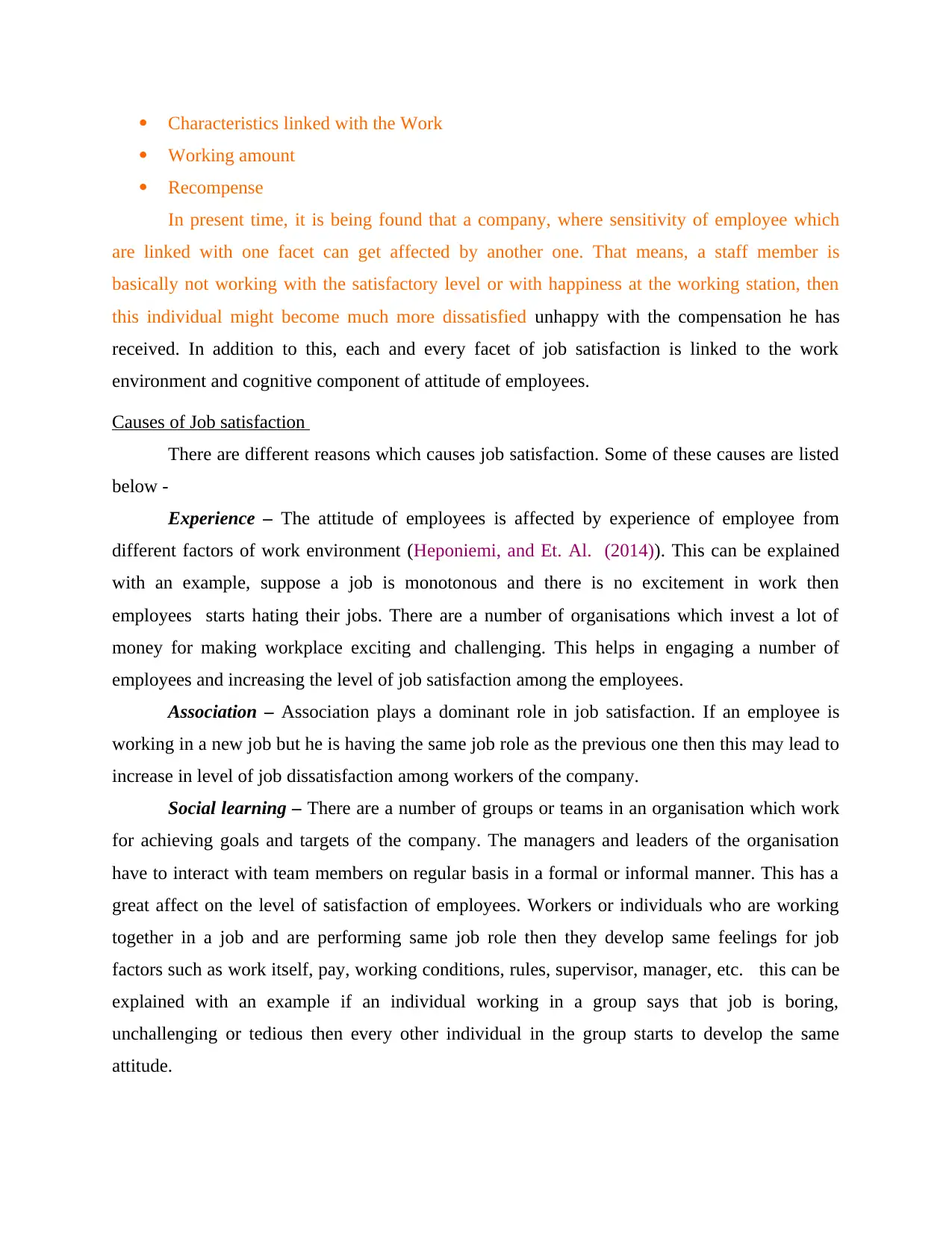
Characteristics linked with the Work
Working amount
Recompense
In present time, it is being found that a company, where sensitivity of employee which
are linked with one facet can get affected by another one. That means, a staff member is
basically not working with the satisfactory level or with happiness at the working station, then
this individual might become much more dissatisfied unhappy with the compensation he has
received. In addition to this, each and every facet of job satisfaction is linked to the work
environment and cognitive component of attitude of employees.
Causes of Job satisfaction
There are different reasons which causes job satisfaction. Some of these causes are listed
below -
Experience – The attitude of employees is affected by experience of employee from
different factors of work environment (Heponiemi, and Et. Al. (2014)). This can be explained
with an example, suppose a job is monotonous and there is no excitement in work then
employees starts hating their jobs. There are a number of organisations which invest a lot of
money for making workplace exciting and challenging. This helps in engaging a number of
employees and increasing the level of job satisfaction among the employees.
Association – Association plays a dominant role in job satisfaction. If an employee is
working in a new job but he is having the same job role as the previous one then this may lead to
increase in level of job dissatisfaction among workers of the company.
Social learning – There are a number of groups or teams in an organisation which work
for achieving goals and targets of the company. The managers and leaders of the organisation
have to interact with team members on regular basis in a formal or informal manner. This has a
great affect on the level of satisfaction of employees. Workers or individuals who are working
together in a job and are performing same job role then they develop same feelings for job
factors such as work itself, pay, working conditions, rules, supervisor, manager, etc. this can be
explained with an example if an individual working in a group says that job is boring,
unchallenging or tedious then every other individual in the group starts to develop the same
attitude.
Working amount
Recompense
In present time, it is being found that a company, where sensitivity of employee which
are linked with one facet can get affected by another one. That means, a staff member is
basically not working with the satisfactory level or with happiness at the working station, then
this individual might become much more dissatisfied unhappy with the compensation he has
received. In addition to this, each and every facet of job satisfaction is linked to the work
environment and cognitive component of attitude of employees.
Causes of Job satisfaction
There are different reasons which causes job satisfaction. Some of these causes are listed
below -
Experience – The attitude of employees is affected by experience of employee from
different factors of work environment (Heponiemi, and Et. Al. (2014)). This can be explained
with an example, suppose a job is monotonous and there is no excitement in work then
employees starts hating their jobs. There are a number of organisations which invest a lot of
money for making workplace exciting and challenging. This helps in engaging a number of
employees and increasing the level of job satisfaction among the employees.
Association – Association plays a dominant role in job satisfaction. If an employee is
working in a new job but he is having the same job role as the previous one then this may lead to
increase in level of job dissatisfaction among workers of the company.
Social learning – There are a number of groups or teams in an organisation which work
for achieving goals and targets of the company. The managers and leaders of the organisation
have to interact with team members on regular basis in a formal or informal manner. This has a
great affect on the level of satisfaction of employees. Workers or individuals who are working
together in a job and are performing same job role then they develop same feelings for job
factors such as work itself, pay, working conditions, rules, supervisor, manager, etc. this can be
explained with an example if an individual working in a group says that job is boring,
unchallenging or tedious then every other individual in the group starts to develop the same
attitude.
⊘ This is a preview!⊘
Do you want full access?
Subscribe today to unlock all pages.

Trusted by 1+ million students worldwide
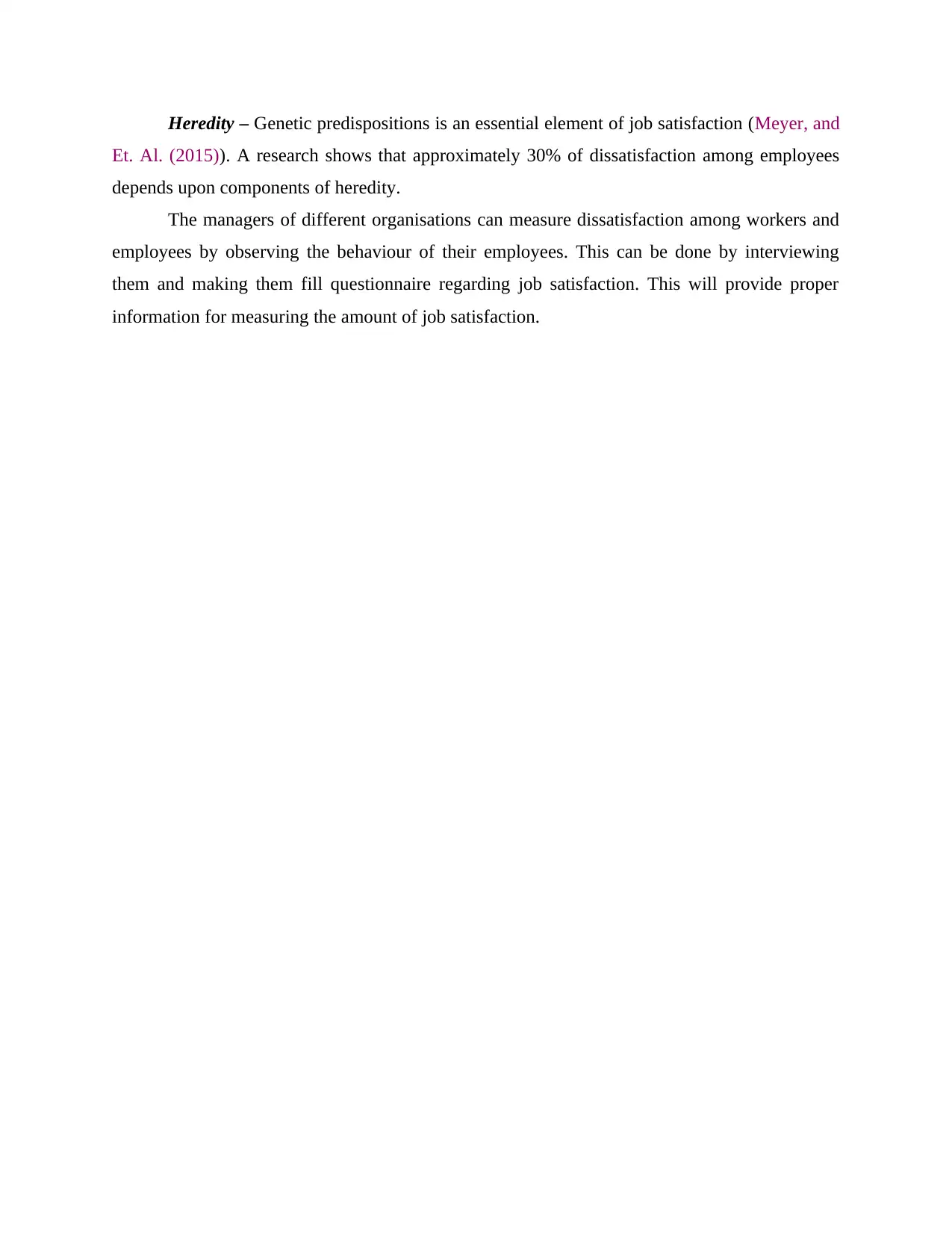
Heredity – Genetic predispositions is an essential element of job satisfaction (Meyer, and
Et. Al. (2015)). A research shows that approximately 30% of dissatisfaction among employees
depends upon components of heredity.
The managers of different organisations can measure dissatisfaction among workers and
employees by observing the behaviour of their employees. This can be done by interviewing
them and making them fill questionnaire regarding job satisfaction. This will provide proper
information for measuring the amount of job satisfaction.
Et. Al. (2015)). A research shows that approximately 30% of dissatisfaction among employees
depends upon components of heredity.
The managers of different organisations can measure dissatisfaction among workers and
employees by observing the behaviour of their employees. This can be done by interviewing
them and making them fill questionnaire regarding job satisfaction. This will provide proper
information for measuring the amount of job satisfaction.
Paraphrase This Document
Need a fresh take? Get an instant paraphrase of this document with our AI Paraphraser
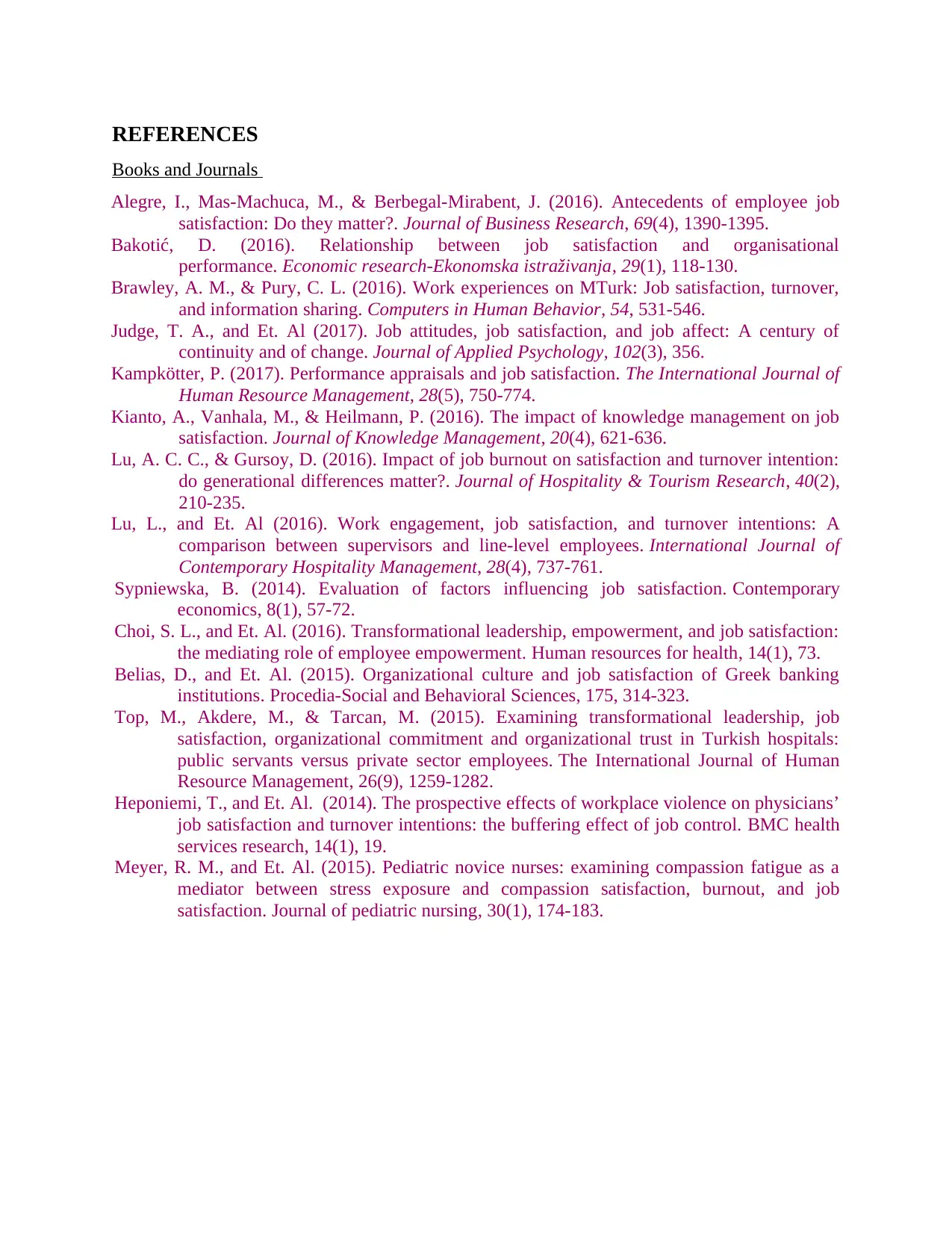
REFERENCES
Books and Journals
Alegre, I., Mas-Machuca, M., & Berbegal-Mirabent, J. (2016). Antecedents of employee job
satisfaction: Do they matter?. Journal of Business Research, 69(4), 1390-1395.
Bakotić, D. (2016). Relationship between job satisfaction and organisational
performance. Economic research-Ekonomska istraživanja, 29(1), 118-130.
Brawley, A. M., & Pury, C. L. (2016). Work experiences on MTurk: Job satisfaction, turnover,
and information sharing. Computers in Human Behavior, 54, 531-546.
Judge, T. A., and Et. Al (2017). Job attitudes, job satisfaction, and job affect: A century of
continuity and of change. Journal of Applied Psychology, 102(3), 356.
Kampkötter, P. (2017). Performance appraisals and job satisfaction. The International Journal of
Human Resource Management, 28(5), 750-774.
Kianto, A., Vanhala, M., & Heilmann, P. (2016). The impact of knowledge management on job
satisfaction. Journal of Knowledge Management, 20(4), 621-636.
Lu, A. C. C., & Gursoy, D. (2016). Impact of job burnout on satisfaction and turnover intention:
do generational differences matter?. Journal of Hospitality & Tourism Research, 40(2),
210-235.
Lu, L., and Et. Al (2016). Work engagement, job satisfaction, and turnover intentions: A
comparison between supervisors and line-level employees. International Journal of
Contemporary Hospitality Management, 28(4), 737-761.
Sypniewska, B. (2014). Evaluation of factors influencing job satisfaction. Contemporary
economics, 8(1), 57-72.
Choi, S. L., and Et. Al. (2016). Transformational leadership, empowerment, and job satisfaction:
the mediating role of employee empowerment. Human resources for health, 14(1), 73.
Belias, D., and Et. Al. (2015). Organizational culture and job satisfaction of Greek banking
institutions. Procedia-Social and Behavioral Sciences, 175, 314-323.
Top, M., Akdere, M., & Tarcan, M. (2015). Examining transformational leadership, job
satisfaction, organizational commitment and organizational trust in Turkish hospitals:
public servants versus private sector employees. The International Journal of Human
Resource Management, 26(9), 1259-1282.
Heponiemi, T., and Et. Al. (2014). The prospective effects of workplace violence on physicians’
job satisfaction and turnover intentions: the buffering effect of job control. BMC health
services research, 14(1), 19.
Meyer, R. M., and Et. Al. (2015). Pediatric novice nurses: examining compassion fatigue as a
mediator between stress exposure and compassion satisfaction, burnout, and job
satisfaction. Journal of pediatric nursing, 30(1), 174-183.
Books and Journals
Alegre, I., Mas-Machuca, M., & Berbegal-Mirabent, J. (2016). Antecedents of employee job
satisfaction: Do they matter?. Journal of Business Research, 69(4), 1390-1395.
Bakotić, D. (2016). Relationship between job satisfaction and organisational
performance. Economic research-Ekonomska istraživanja, 29(1), 118-130.
Brawley, A. M., & Pury, C. L. (2016). Work experiences on MTurk: Job satisfaction, turnover,
and information sharing. Computers in Human Behavior, 54, 531-546.
Judge, T. A., and Et. Al (2017). Job attitudes, job satisfaction, and job affect: A century of
continuity and of change. Journal of Applied Psychology, 102(3), 356.
Kampkötter, P. (2017). Performance appraisals and job satisfaction. The International Journal of
Human Resource Management, 28(5), 750-774.
Kianto, A., Vanhala, M., & Heilmann, P. (2016). The impact of knowledge management on job
satisfaction. Journal of Knowledge Management, 20(4), 621-636.
Lu, A. C. C., & Gursoy, D. (2016). Impact of job burnout on satisfaction and turnover intention:
do generational differences matter?. Journal of Hospitality & Tourism Research, 40(2),
210-235.
Lu, L., and Et. Al (2016). Work engagement, job satisfaction, and turnover intentions: A
comparison between supervisors and line-level employees. International Journal of
Contemporary Hospitality Management, 28(4), 737-761.
Sypniewska, B. (2014). Evaluation of factors influencing job satisfaction. Contemporary
economics, 8(1), 57-72.
Choi, S. L., and Et. Al. (2016). Transformational leadership, empowerment, and job satisfaction:
the mediating role of employee empowerment. Human resources for health, 14(1), 73.
Belias, D., and Et. Al. (2015). Organizational culture and job satisfaction of Greek banking
institutions. Procedia-Social and Behavioral Sciences, 175, 314-323.
Top, M., Akdere, M., & Tarcan, M. (2015). Examining transformational leadership, job
satisfaction, organizational commitment and organizational trust in Turkish hospitals:
public servants versus private sector employees. The International Journal of Human
Resource Management, 26(9), 1259-1282.
Heponiemi, T., and Et. Al. (2014). The prospective effects of workplace violence on physicians’
job satisfaction and turnover intentions: the buffering effect of job control. BMC health
services research, 14(1), 19.
Meyer, R. M., and Et. Al. (2015). Pediatric novice nurses: examining compassion fatigue as a
mediator between stress exposure and compassion satisfaction, burnout, and job
satisfaction. Journal of pediatric nursing, 30(1), 174-183.
1 out of 8
Related Documents
Your All-in-One AI-Powered Toolkit for Academic Success.
+13062052269
info@desklib.com
Available 24*7 on WhatsApp / Email
![[object Object]](/_next/static/media/star-bottom.7253800d.svg)
Unlock your academic potential
Copyright © 2020–2026 A2Z Services. All Rights Reserved. Developed and managed by ZUCOL.





